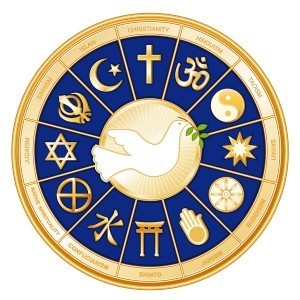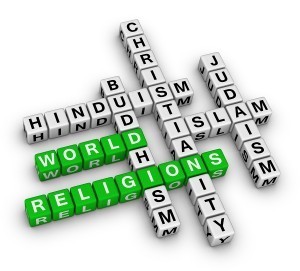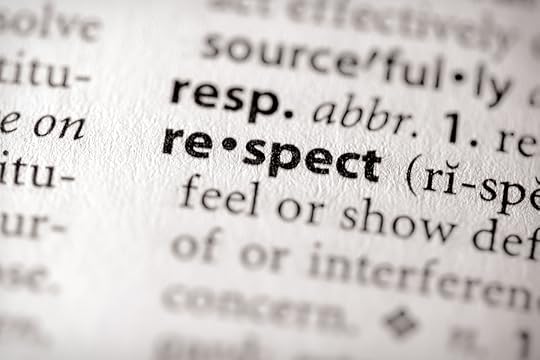Who Believes What?
 When the Willow Creek Community Church did a survey they found that some in their congregation, and especially their post-Christian friends, thought that all world religions are essentially the same. If their doctrines are similar and point in the same direction, why is it important to choose the “right” one? In response to the survey, the church invited a learned representative from each of the major faiths to a service. A Hindu, Buddhist, Muslim, Jew, and Christian sat together on the platform and answered questions from the moderator Bill Hybels.
When the Willow Creek Community Church did a survey they found that some in their congregation, and especially their post-Christian friends, thought that all world religions are essentially the same. If their doctrines are similar and point in the same direction, why is it important to choose the “right” one? In response to the survey, the church invited a learned representative from each of the major faiths to a service. A Hindu, Buddhist, Muslim, Jew, and Christian sat together on the platform and answered questions from the moderator Bill Hybels.
I cannot do full justice to the fascinating discussion that took place that Sunday without reproducing it verbatim. Barring that, I will condense some of the main points instead. Keep in mind that a different spokesperson for one of the faiths might have come up with different responses, but these do broadly reflect some of the differences in common beliefs.
What is your understanding of God?
Hindu: God was All-consciousness, before creation, and out of his playtime he created the universe. So God in one form is the creation, and also to put life into it he entered the creation, countless times. Indeed, anyone can attain Godhood status by following the rules set out.
Buddhist: We focus not on God or gods, but on the teachings of Gautama Buddha who lived in the 5th century B.C. We strive, like the Buddha, to become enlightened human beings, who serve out of compassion and try to end suffering in the world.
Muslim: God is a mercy-giver. He is peace. He is the first and last. He is the owner of the Day of Judgment. He is the owner of the universe. He is the guide. He is the light. He is the Mercy.
Jew: I would suspect everyone here would recognize the God of Judaism through Judaism’s daughter religions, Christianity and Islam, both of which have patterned their own theology after the mother religion, Judaism.
Christian: God is all-powerful, all-knowing and everywhere present. He is spirit and exists eternally in three persons, God the Father, God the Son, and God the Holy Spirit. Also, he is a personal God, which means he invites me to get to know him and to grow in a deep, loving relationship with him.
A person comes to you and says, “My life is a mess, I have wandered very far away from God, I have misbehaved, I have done terrible things. I want to get close to God.” How would you instruct that person?
Hindu: He has to go to the Scriptures to read the holy books, and to go to the place of worship to where the holy ones are. And that would be only a stepping stone. From the books he will get instructions, and he must follow those instructions.
Buddhist: If a person is seeking a relationship with God, they have come to the wrong place because the Buddhist tradition is not focused on God. However, if you come to a Buddhist teacher and you’re troubled, depressed, angry or dissatisfied, you’ve come to the right place because they will be able to give you some very specific ways to change the way you think and to clean out the difficulties.
Muslim: We believe that all human beings are born believers. In their heart, regardless of how bad they are, there is a spot there that believes in God, and all we have to do is to bring about the point and to open the ears, to see and hear and feel the existence of God.
Jew: You can’t deal with deep-felt guilt simply through belief and a deity removing that terrible fear and guilt from you. If that were true there would be no need for psychologists, psychiatrists, psychoanalysts—to whom go priests, rabbis, pastors who do believe in God profoundly and devoutly, but that doesn’t always take care of the deepest quest of the human being. I think relating to God is relating pretty much as the deepest relationships available to human beings are.
Christian: This is the central message of the Bible, how to relate to God. When we put our faith in Jesus Christ alone, who paid the penalty for our sins, God promises to wipe our sins out, and we are brought into a growing, loving relationship with God.
What do you think of Jesus Christ? According to your tradition, who was Jesus of Nazareth?
Hindu: This world is God’s drama. He created so many religions, and he wanted variety for his own pleasure. When Jesus Christ came and Christianity came about, this was God manifesting himself in Jesus Christ. We have tolerance for all the gods, and we tell everyone you go pray to your god, if you have that belief, and continue what you are doing.

Buddhist: Jesus was a human being, a wise and compassionate human being who was concerned for the suffering of humanity. And the Buddhist tradition would also recognize the perspective that Jesus is the son of God, though not the only way to God.
Muslim: We believe in the prophets of God, which include Jesus, peace be upon him. But we do not believe he died on the cross. The Koran says he was not killed or crucified. He has been lifted by God and will be coming back to guide all mankind according to Islam.
Jew: As for the preeminence of Jesus over any other religion’s central figure, we leave that up to anybody to decide for themselves; we have our Bible and our prophets, and they have their Bible and their prophets, and we let it go at that.
Christian: Jesus Christ is the one and only Son of God, fully human and fully God, without sin, the only one worthy or qualified to forgive sin. He proved he was God when he was resurrected, and he also proved that he could defeat death and forgive sin.
One final question: What about the life after this life? If you were to die after this service, what would happen?
Hindu: The Hindus believe in reincarnation, a continuation of life. Before my birth, there must have been thousands of births before. Based on my actions and my next birth, I might go into a lower creature, or I might elevate myself, at least until I reach the state of full consciousness.
Buddhist: Afterlife is problematic. If enlightenment has occurred before death then there is complete liberation, or complete nirvana, which cannot be described or explained. It is neither eternal consciousness or annihilation. It is not in our intellectual capacity to comprehend it.
Muslim: Every human being has a reserved seat in heaven and in hell. The angels will ask you what happened in your life, who was your God, who was your prophet, what was your religion, what was your book. So at the moment of death, those who are going to heaven will be shown their reserved place in hell—and what happened by the grace of God that they were saved from going to that hell—then they will be sent to heaven. Otherwise, people will be shown the other way. We all have to be prepared.
Jew: Rabbis have said that the quality of your life after death depends on the character of your life on earth. “The righteous among all the nations of the world have a share in the world to come.”
Christian: The soul will live forever in eternity, and the choices that we make here and now will determine our eternal destiny. If we choose to ignore God or reject God, or to ignore the separation [sin] problem, we will spend an eternity separated from God, and that place is called hell. On the other hand, if we choose to solve the separation problem God’s way by receiving Jesus Christ into our lives, and allowing him to forgive our sins and bridge the gap, we will spend an eternity with God in heaven.
 Bill Hybels concluded by challenging the congregation to become diligent seekers of the truth, doing the hard work of deciding what to believe and why. Clearly, not all religions teach the same answers to ultimate questions.
Bill Hybels concluded by challenging the congregation to become diligent seekers of the truth, doing the hard work of deciding what to believe and why. Clearly, not all religions teach the same answers to ultimate questions.
“We live in a very diverse world, and we have to learn to get along with and respect and show deference and kindness to people who represent different religions,” he said. “I hope, as we leave, you will leave with the words of Jesus on your mind: the highest kingdom law or value is the law of love. And while we may disagree about where we drive our stake of conviction and belief, we are called to be compassionate, understanding, and respectful of those who believe differently.”
 newest »
newest »
 No wonder people are confused!
No wonder people are confused!




